Water management for high-productivity commercial agriculture
The institute is a trusted expert in technology and management practices related to high-productivity commercial agriculture. We innovate practices, technologies and decision support systems that can be applied and integrated into water-wise and climate-smart agricultural systems that are both productive and sustainable.
Expansion of the DWFI’s multi-state network of flux towers
In January 2024, the Upper Colorado River Basin Commission awarded DWFI a grant of more than $3 million over a period of five years through funding from the Bipartisan Infrastructure Law managed by the U.S. Bureau of Reclamation. The funding will expand DWFI’s existing multi-state flux tower network into the Upper Colorado River Basin states of Wyoming, Colorado and New Mexico with the installation of 10 new eddy covariance flux towers.
The towers provide the most accurate method of measuring ET (evapotranspiration: total plant transpiration and soil evaporation into the air), a key measurement for determining a crop’s unique daily water needs. Accurate and timely ET data is necessary for assessing irrigation water consumption, water budgets, water productivity, plant stress and drought – ultimately helping growers apply the precise amount of water that crops need, when they need it, to achieve the best possible yields. The data from the towers will be used to ground truth DWFI’s GloDET and SETMI models, along with an OpenET model provided by the Upper Colorado River Basin. Data will be released publicly through the Ameriflux portal.
These tools and measurements are especially critical in the Colorado River Basin, which is coming out of a 22-year drought. Despite some recharging of the basin through the winters of 2022 and 2023, researchers, water managers, farmers and policy makers are working to better understand the consumptive water use and evapotranspiration of crops in the area to ensure they can effectively manage water for years to come.
The flux tower network is part of DWFI’s suite of water management tools, which accurately measure crop-water use and carbon-equivalent emissions. The network has also helped to validate carbon credits; supported water management decisions and interstate water agreement negotiations; and generated numerous partnerships, grants and interest from partners.
-
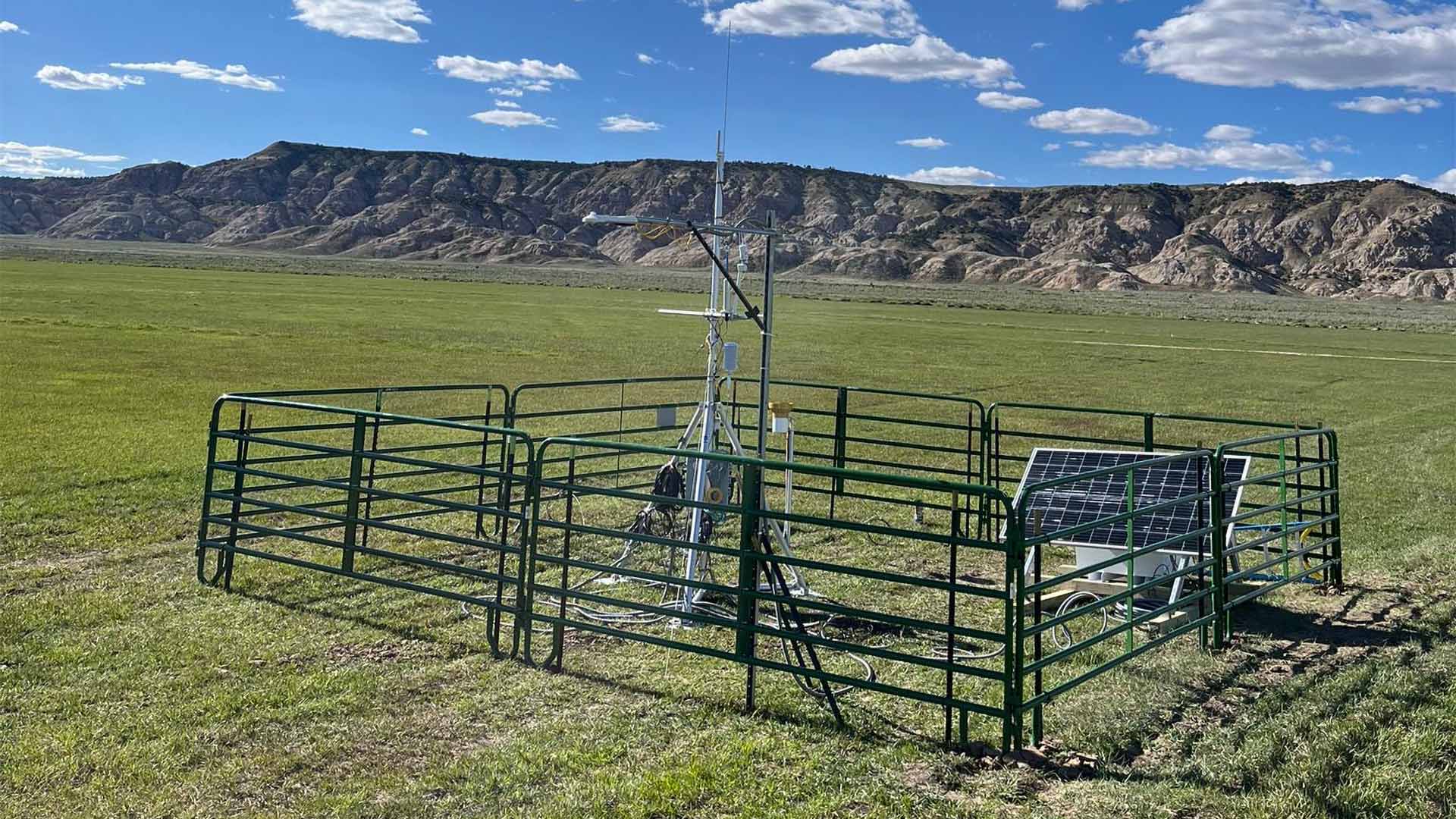
A newly-installed eddy covariance flux tower on a farm in the Upper Colorado River Basin. Credit: DWFI
-
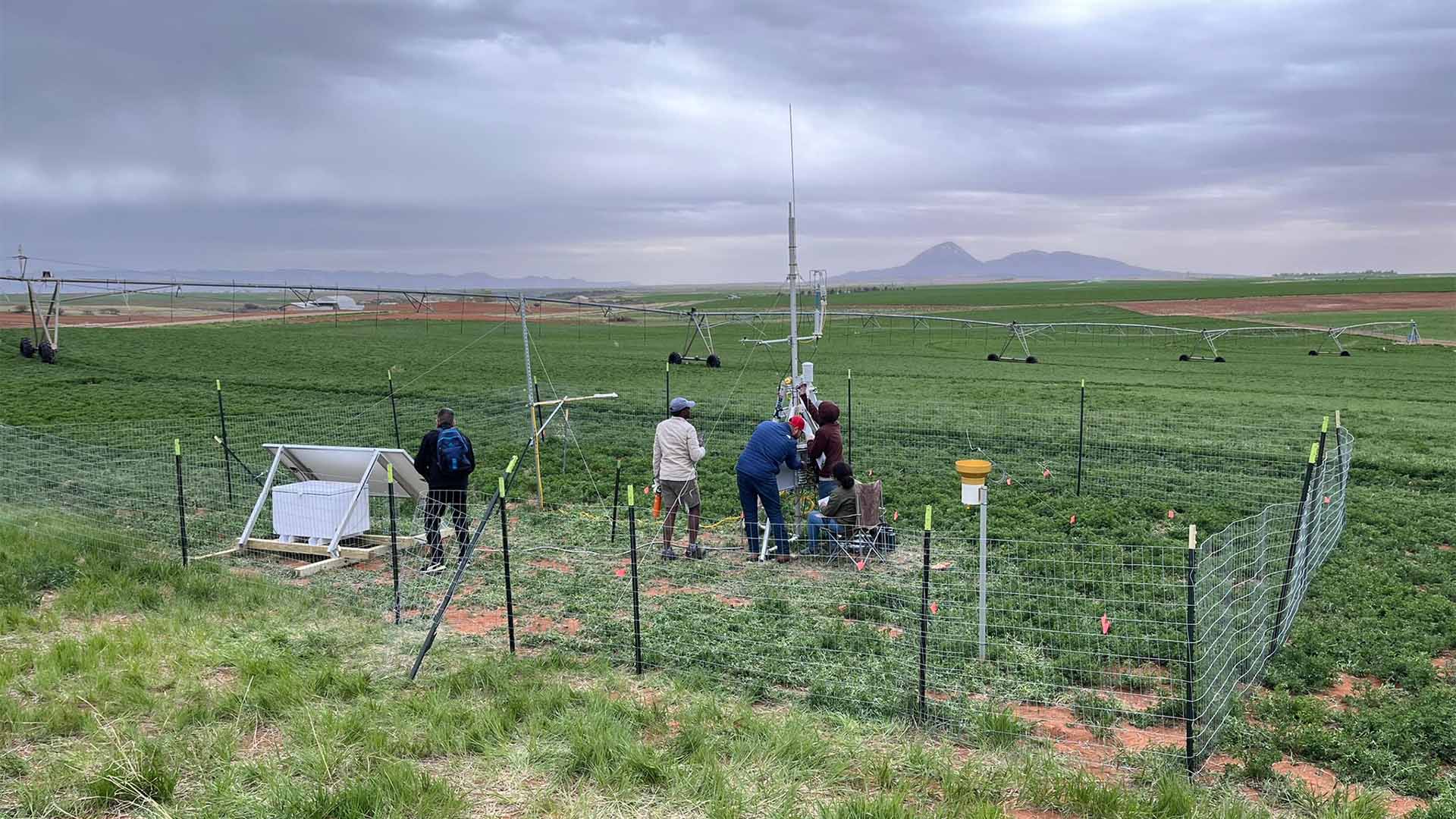
DWFI staff install an eddy covariance flux tower on a farm in the Upper Colorado River Basin. Credit: DWFI
-
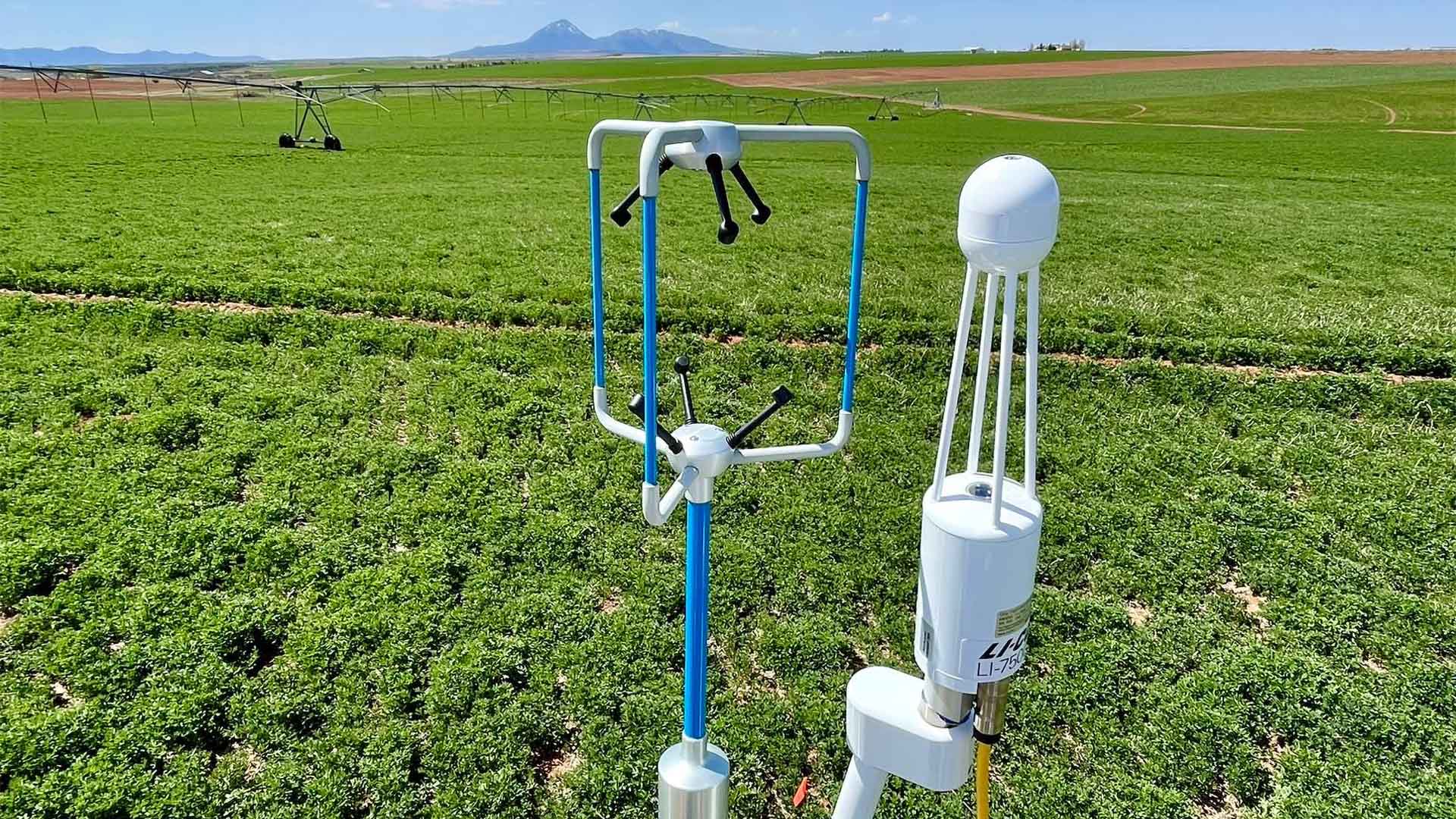
Eddy covariance flux towers determine movement of water vapor and other gasses in cropped fields. The variance in this movement and the composition of the air helps measure evapotranspiration (ET) more exactly. Credit: DWFI
-
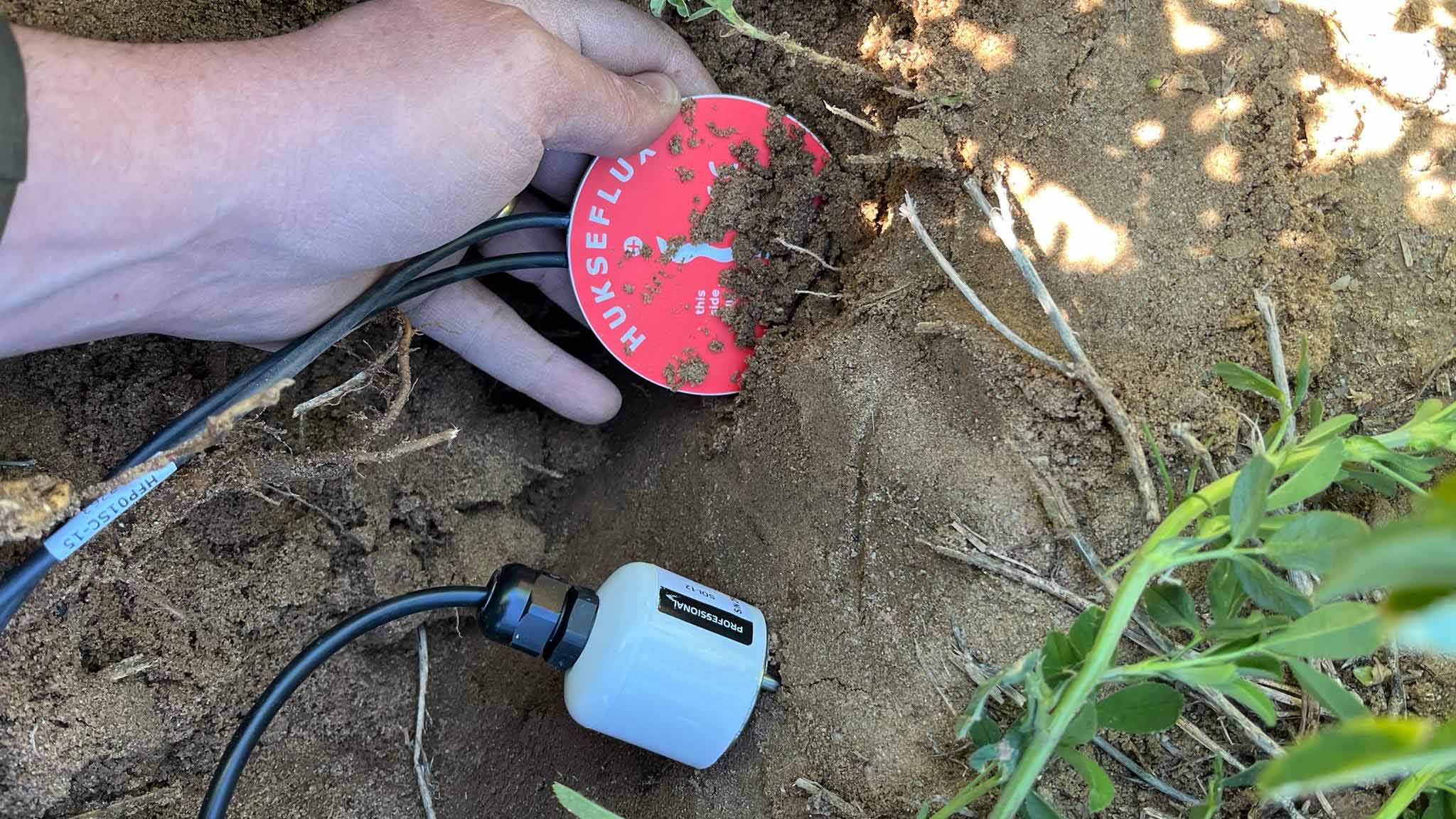
The Parallel 41 Flux Network provides the most accurate method of measuring ET (evapotranspiration: total plant transpiration and soil evaporation into the air), a key measurement for determining a crop’s unique daily water needs. Credit: DWFI
The DAWN of a new day in commercial crop productivity
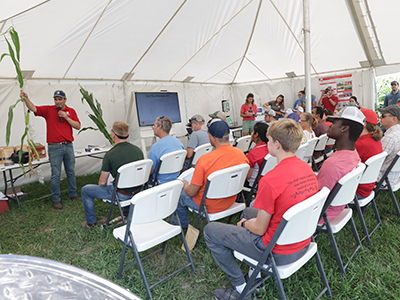
Together with several leading organizations and funding from USDA, DWFI is using advanced technology, including unmanned aerial vehicles (UAVs) and satellite imagery, to provide highly accurate data for the Dashboard for Agricultural Water use and Nutrient management (DAWN) project. This collaborative 5-year, $10 million U.S. Department of Agriculture-funded project has developed an informative and multifaceted database for farmers, water managers, consultants and others to help them improve agricultural water use and enhance crop productivity in the nation’s Corn Belt. The database includes climate forecasts that help users plan their crop management to maximize yields while minimizing environmental impacts. It is purposefully designed to be easily accessed online and user-friendly, making it a valuable tool for stakeholders, as well as an educational resource for agriculture students.
Recent Phase 2 improvements to DAWN include:
- Ability for farmers to use seasonal forecasts from multiple sources to evaluate potential impact on crop growth;
- New tool for viewing forecasts and predicted ranges for temperature and precipitation;
- New calculator for estimating when corn crop will achieve specific levels of moisture;
- Updated “growing degree days” tool for estimating corn growth and growing season outcomes and compare to previous years;
- Updated crop progress tool for predicting dates for important corn growth stages;
- Updated dashboard layout and tools for improved user experience.
DAWN is readily available to stakeholders without cost or advertising and all data is secured. User feedback is appreciated and helps to inform future database capabilities.
Enabling new market incentives for efficiency in feedstock production and carbon management
A DWFI-led project is helping agricultural producers and supply chains prepare for and mitigate the effects of climate change. The research is funded by the U.S. Department of Energy’s (DoE) ARPA-E (Advanced Research Projects Agency-Energy) program and is being conducted at the University of Nebraska Eastern Nebraska Research, Extension and Education Center (ENREEC). Using a long-term system, researchers can measure carbon dioxide, nitrous oxide and methane gas fluxes in the soil. This technology provides real-time access to soil gas data, which can be used to quantify feedstock-related emissions at the field-level. This data can be used to incentivize adoption of new technologies and management practices that simultaneously improve yield, drive down production-associated emissions, and enhance carbon sequestration in soils.
Varied approaches used for groundwater transfers in Nebraska
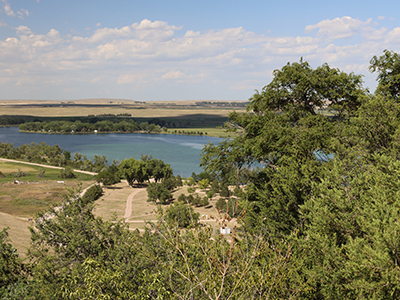
DWFI published a new report documenting the variety of approaches to groundwater transfers already in use in Nebraska and providing guidelines for practitioners interested in establishing water markets in different regions. The report, titled "Groundwater Transfers in Nebraska" expands on the team's previous work to better understand the context and details related to long-standing groundwater transfers in seven of Natural Resources Districts in Nebraska.
In Nebraska, landowners have limited access to water resources needed for irrigation. Well-designed groundwater market mechanisms can provide the flexibility needed to adapt to changing local hydrology. They can reduce growers’ risk without gambling with environmental needs. The new report explores existing groundwater transfer rules, regulatory frameworks, and practices at use in the state and showcases the variety of approaches to groundwater transfers in Nebraska in order to provide guidelines for practitioners interested in establishing new water markets in other regions.
Analyzing and catalyzing the agtech startup ecosystems in Nebraska and beyond
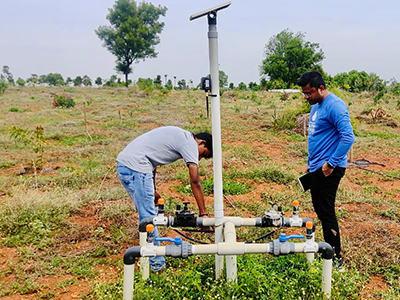
Understanding and mapping the varied regional ecosystems that support agtech entrepreneurship can help identify functional gaps in the ecosystem, facilitate and expedite commercialization, and aid startup founders and investors in leveraging existing resources. A supportive ecosystem for agricultural startups in general is essential to driving agricultural productivity growth and meeting the growing demand for food.
DWFI and Invest Nebraska released their first “Nebraska agtech startup ecosystem map” in 2021. Since then, more than 10 new agtech startups have been founded in Nebraska. At the same time, the broader innovation ecosystem has grown, contributing to the state’s economic development. The new 2024 agtech innovation map looks at the evolving and expanding entrepreneurial landscape in Nebraska and was presented to Nebraska Governor Jim Pillen at an Agriculture Week celebration on March 19 at Nebraska Innovation Campus. DWFI has done similar research on agtech startups in India and irrigation entrepreneurs in sub-Saharan Africa, in addition to producing a business model canvas for Agriworks, an irrigation startup serving smallholder farmers in Uganda.
Related articles
- DWFI & Invest Nebraska Release 2024 Nebraska Agtech Innovation Ecosystem Map (March 19, 2024)
- DAWN Project testing its decision-support tools with corn and soybean growers (DWFI FY2023 Annual Report)
- DAWN Project Launches First Phase of an Innovative, Web-based Decision-support Tool (March 15, 2023)
- DWFI's flux tower network now helps validate carbon credits (DWFI FY23 Annual Report)
- Groundwater transfer success stories guide water managers in meeting local water needs (DWFI FY2023 Annual Report)
Top image caption
DWFI staff pose for a photo while installing an eddy covariance flux tower on a farm in the Upper Colorado River Basin.
Credit: DWFI
COOKIE USAGE:
The University of Nebraska System uses cookies to give you the best online experience. By clicking "I Agree" and/or continuing to use this website without adjusting your browser settings, you accept the use of cookies.

